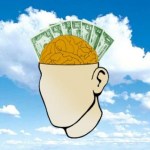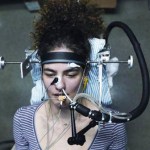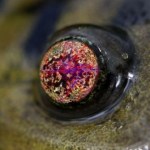neurobiology
Blurring, chopping and blocking. Three online items this week all deal with some pretty dynamic phenomena.
The blurring is in our perceptions. It turns out that if you even think you have lost money in an experiment, your ability to distinguish between musical notes will be hampered. What’s the connection? Dr. Rony Paz has been showing that this tendency to lump sounds together is tied to fear. In our evolutionary past, humans may have survived because anything that sounded remotely like a predator aroused an immediate “fight or flight” response. But if mild stress can provoke a similar…
The story so far: Mario Beauregard published a very silly article in Salon, claiming that Near-Death Experiences (NDEs) were proof of life after death, a claim that he attempted to support with a couple of feeble anecdotes. I replied, pointing out that NDEs are delusions, and his anecdotal evidence was not evidence at all. Now Salon has given Beauregard another shot at it, and he has replied with a "rebuttal" to my refutation. You will not be surprised to learn that he has no evidence to add, and his response is simply a predictable rehashing of the same flawed reasoning he has exercised…
The actors on the stage work their magic, turning a few disparate phrases - "challenge, giving birth, infinity, chaos, visiting a new country" - into a brief but charming improvised sketch, to the delight of the audience. But the viewers, filling a large auditorium at the Weizmann Institute of Science, expect more than to be entertained. Since the improvised play is part of a lecture by Prof. Uri Alon, a Molecular Cell Biologist, they know scientific insights are bound to follow.
Indeed. Combining his two passions, science and theater, Alon has recently created a "theater lab" on the…
I said I didn't want to say anything about free will, and I still don't, but Massimo Pigliucci weighed in, and Jerry Coyne responded, and so did Sean Carroll, and of course I created a free will thread for everyone else to talk about it, so I guess there's a fair bit of momentum behind it all.
I don't understand why free will was getting all tangled up in indeterminacy vs. determinism, since that seems to be a completely independent issue. I'll sum up my opinion by agreeing with Jerry Coyne:
Of course, whether the laws of physics are deterministic or probabilistic is, to me, irrelevant to…
This week's new Weizmann science stories are on ants and bats. Two different models for investigating human behavior? Yes, but not exactly in the ways you might imagine, and so much more than that.
Dr. Ofer Feinerman, the "ant scientist," is a new member of the Physics Faculty. In his graduate research under Prof. Elisha Moses in the Physics of Complex Systems Department, Feinerman created artificial circuits out of neurons. Now he has turned to investigating the complexities of ant societies. What, you might ask, do neurons and ant colonies have to do with physics? The answer is: They…
It's another update on the bloggin' students in my Neuroscience course, and what they've been thinking about.
dorsal neural tube and mirror neurons
ESP
Asymmetry and genes and coffee
Mind reading software
MS and aneurysms
Cell migration and the amygdala
Delamination and more synesthesia
Sleep
Oxytocin
Cocaine and cupcakes
Rev. Frost will write something soon
Motherhood and gay flies
Hallucinations
They all welcome visits and comments!
(Also on FtB)
I gave them an exam, that's what. That and long boring lecturings at 8am on pattern formation in the nervous system. But otherwise, I've had them blogging, so we can take a peek into the brain of a typical college student and see what actually engages them.
Neural stem cells.
Zeta inhibitory peptide.
Aquaporin.
Time perception and bungee jumping.
Olfactory templates.
Porn.
Synesthesia.
Visual hallucinations…in blind people.
Immortality.
Mirror neurons.
Keeping time in the brain.
Facebook.
Synesthesia (again—blame Eagleman, who came to talk to the class).
I…
The olfactory membranes in your nose are densely packed with smell receptors. These receptors come in some 400 different subtypes; complex odors like that of rose petals can waft around 175 distinct kinds of odor molecules in the direction of your nose. In other words, the number of discrete odors we can perceive runs to the tens of thousands. No wonder scientists had thought that the whole smell arrangement was basically random.
But research by Prof. Noam Sobel and his team in the Weizmann Neurobiology Department is bringing our noses into line with our other sensory organs. The arrangement…
As long as it isn't too complicated and you don't expect much detail or fidelity to a model.
So watch this guy. He can draw Rome.
(via Noggin Bloggin')
(Also on FtB)
I've got my neurobiology students blogging — all I ask is that they write something relevant to understanding how brains work. Let's see where their minds are at this week, shall we?
Peer pressure.
Cute cuddly animals.
Video games.
Alzheimer's disease.
Rat tickling.
Smoking and Alzheimer's.
Cephalopod brains.
Moral dilemmas.
Membrane chemistry.
Lies!
Evasive flies.
Phantom limbs.
Concussions.
(Also on FtB)
This story is some kind of awesome:
For those who don't want to watch the whole thing, the observation in brief is that color perception is affected by color language. The investigators compare Westerners with our familiar language categories for color (red, blue, green, yellow, etc.) to the people of the Himba tribe in Africa who have very different categories: they use "zoozu", for instance, for dark colors, which includes reds, greens, blues, and purples, "vapa" for white and some yellows, "borou" for specific shades of green and blue. Linguistically, they lump together some colors for…
I'm teaching an upper-level course in neurobiology this term, and as I usually do, I made all the poor suffering students go out and create blogs, and I also told them they had to write one post a week about neuroscience. Today I was asked if I was going to pharyngulate their blogs, and of course I said I would. So go forth and harrass them! A word of warning, though: as many people learned last time I did this, these are not passive, cowed students, but feisty upperclassmen who are comfortable with biting back; the worst thing you can do is be condescending or patronizing.
neurobiology…
Dr. Nachum Ulanovsky of the Weizmann Institute and Prof. Ran Nathan and Asaf Tsoar of the Hebrew University of Jerusalem have captured live fruit bats and glued tiny GPS transmitters to their backs, then driven the bats overnight to a site some 80 kilometers away and rappelled into the bats' caves to retrieve the transmitters after they fall off - all in the name of scientific research. In the process, the team has revealed how these bats form mental maps that they use to return to their favorite fruit trees night after night, often flying large distances and bypassing other, similar trees on…
What does a tiny patch of salamander retina see when it watches a movie? Weizmann Institute scientists, together with Dr. Ronen Segev at Ben-Gurion University, performed this experiment - literally showing film sequences to snippets of live retina tissue and recording the interactions between their 100 or so active neurons.
Seeing, as we know, is 3/4 interpretation and, contrary to common belief, this interpretation begins in the eye, before an image ever reaches the brain. Dr. Elad Schneidman and his colleagues found that unique patterns of neuron activity could be identified: There were…
Maybe you've seen this before: it's a diagram of the sensory and motor cortex of the brain, with a little man or homunculus drawn over it to illustrate the somatic areas associated with each region. You see where the little man's knee is on the left image of the sensory cortex? Stick an electrode in there and zap it, and a patient/victim will feel a sensation in his knee. Put the patient in an MRI and tickle his knee, and that region of the brain will light up. Cool, huh?
Another cute feature: look in the medial longitudinal fissure. You see the homunculus's toes, and right down there,…
Today's science news from the Weizmann Institute covers research in neurobiology, environmental science and cancer immunology.
⢠In the first, scientists identified a likely biological marker for autism that shows up even in very young children. Diagnoses of autism are generally not possible so early, as the signs typically appear gradually throughout the first 3-4 years of life. The scientists used fMRI to scan the brains of children aged 1-3 who were just starting to show signs of autistic behavior. Their method: scanning the brains of toddlers while they sleep. It seems that even asleep…
Do you ever doubt your own memory? New research at the Institute suggests that some of the things we think we remember could be wrong. It seems that our brains are surprisingly willing to exchange a true memory for a false one, just on the basis of friends' claims. The scientists not only demonstrated just how easy it is to create false memories, they showed that the switch in memory has a signature pattern of brain activity. The most significant feature? They found strong connectivity between areas of the brain known to be involved in memory and learning, and the amygdala, which, among other…
He's completely lost me again. Brown has a couple of posts up complaining about people referring to mental illness as a "brain disease" and confusing mind with brain — he seems to deplore the growing recognition that the mind is entirely a product of the brain, and that psychology is built on a physical substrate, which leads to what he thinks is a premature reduction of mind to brain. He's not making an argument from dualism, though; the gist of his complaint is that you can't deduce thoughts from the structure of the brain, therefore it's an invalid approach.
That doesn't make any sense. We…
I've met Jon Ronson a few times, including this past weekend, but I can't say I really know him — we've exchanged a few words, I've heard him give a talk, I now him as the short intense guy with the very bad hair, slightly neurotic, expressive, and funny. But I read his book, The Psychopath Test: A Journey Through the Madness Industry(amzn/b&n/abe/pwll) this afternoon while on the train from Cheltenham to Heathrow, and I have this idea of who he is.
He's Hemingway. Yeah, you know, the macho, hard-drinking man's man who would run with the bulls or fish for the marlin or pretend to be a war…
Disturbing experiences don't actually heighten our perceptions. In fact, according to new Weizmann research, in adverse conditions we're more likely to experience slightly different sights or sounds as being the same. The scientists think that this lumping together of similar sensory stimuli may be behind post-traumatic stress syndrome. The experiments showed that volunteers learning to distinguish between similar tones had much more trouble telling them apart when these were associated with a shockingly bad smell. Dr. Rony Paz explains that this blurring of our perceptions may have helped…




